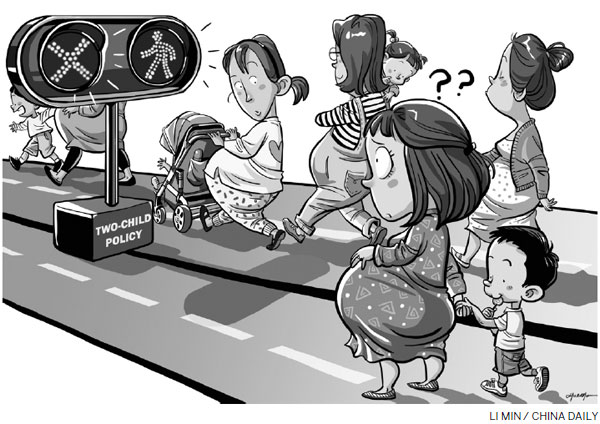Alter family planning rules to suit reality
Libo county officials in Southwest China's Guizhou province recently ordered a woman surnamed Tan to abort her five-month pregnancy because she had violated the local family planning rule. The middle-school teacher has a child from her first marriage and her present husband has an adopted child, so she is not eligible to have another child, the officials said, warning her that she would lose her job for not following the order.
Tan obtained permission to have her second child from Huangshan, Anhui province, where the family planning rule is looser, after transferring her hukou (house registration) from Libo to Huangshan. But after some people said Tan had taken "advantage of the institutional loopholes" to have a second child, the county officials ordered her to undergo abortion.
After the media exposed the incident, Guizhou provincial family planning authorities overruled the Libo officials' abortion order and said the Huangshan permit was valid.
More than 300 million migrant workers work and live in Chinese cities where they do not have hukou. Given their huge number, city authorities have to be more flexible with the family planning policy, instead of continuing with their rigid working style.
Since the central government describes itself more as a public service provider, it needs to ensure that the grassroots policies are in line with the description. How could the Libo officials ignore the public support for Tan and order her to undergo abortion in the fifth month of her pregnancy? Were it not for the media's exposure of the case, Tan could have faced a medical emergency or financial troubles.
Although China has vowed to make it easier for people to seek justice for being mistreated by government officials, few petitioners approach the local courts. Is it because courts are still regarded as part of the bureaucracy?
Many believe departmental interests, in the forms of ill-supervised arbitrary fees or, in many cases, bribes, are the main reason for grassroots officials to resist reform. The controversial social support fee, for example, which nationwide adds up to tens of billions yuan a year, is a compulsory fine couples breaking the family planning policy are forced to dish out to "repay the government for the cost it incurs to take care of the children born without permits". The fact is, some grassroots family planning authorities regard the system as a cash cow to fatten themselves.
The family planning policy should be revised to meet the demands of the fast changing national conditions. It should be the same across the country, so that the legal basis for having different public policies in different places of the country is eliminated. More importantly, the law should clearly define people's legal rights and interests, and create effective channels for them to defend them, instead of only emphasizing their obligations.
The author is a writer with China Daily. liyang@chinadaily.com.cn




